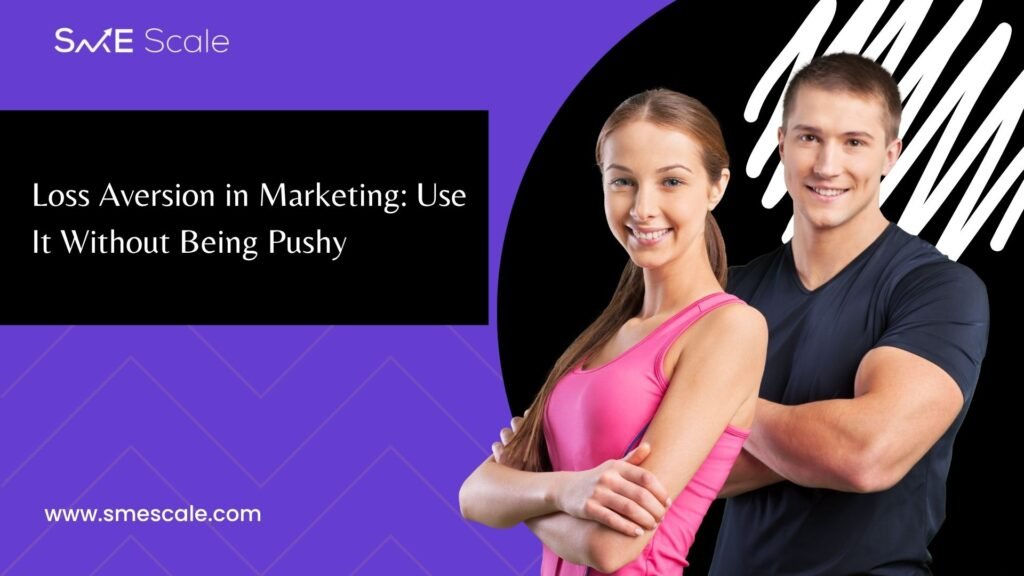
In the fast-paced digital marketplace, attention is currency—and trust is gold. For SMEs aiming to scale without resorting to gimmicks, understanding buyer psychology is a powerful edge. One of the most compelling tools in the psychological marketing arsenal is loss aversion—but when misused, it comes across as manipulative or desperate.
At SME Scale, we help businesses build systems that drive sustainable sales growth by using principles of behavioral science with integrity. In this blog, we’ll unpack what loss aversion is, how SMEs can apply it ethically, and share a real-life case study of a service-based business that used it to boost conversions—without damaging their brand.
🧠 What is Loss Aversion?
Loss aversion is a cognitive bias described by psychologists Amos Tversky and Daniel Kahneman. In simple terms:
People feel the pain of losing something more strongly than the pleasure of gaining something.
In numbers, a loss can be twice as psychologically impactful as a gain of the same size. This instinct to avoid loss influences decisions every day—from signing up for a free trial to staying loyal to a subscription you barely use.
For SMEs, loss aversion can be a potent persuasion tool when framed properly.
🎯 Why Loss Aversion Works for SME Marketing
The psychology behind loss aversion ties into several buyer motivations:
FOMO (Fear of Missing Out)
Drives urgency and immediacy.
Sunk Cost Fallacy
Keeps customers from abandoning a service they’ve already invested in.
Commitment Bias
Encourages people to stay consistent with their previous choices.
These psychological triggers, when embedded into your marketing funnel, don’t just boost conversions—they build momentum.
📈 Case Study: How a Boutique Consultancy Increased Trial Conversions by 58%
Client: Apex Advisory (Financial services consultancy)
Challenge: Website traffic was steady, but free consultation signups were stalling.
SME Scale Solution: Implemented Ethical Loss Aversion Triggers within a full-funnel strategy.
Step 1: Introduced a “Limited Slots” Banner
Insight: Their consultations were indeed limited per month, but this wasn’t communicated.
Tactic: We added a dynamic banner saying,
“Only 3 free consultation slots left this month—secure yours today.”
Psychological Trigger: Scarcity + Loss Aversion
Result: 41% lift in CTA clicks within the first week.
Step 2: Created a Value-Driven Comparison Guide
Insight: Prospects weren’t fully grasping what they’d miss by not booking.
Tactic: We built a simple side-by-side comparison:
“What You Gain With Apex” vs. “What You Risk Without It”
Examples included:
✅ Clear tax strategy vs. ❌ Potential overpayment
✅ Structured growth plan vs. ❌ Missed scaling opportunities
Psychological Trigger: Future Regret Aversion
Result: 58% increase in free consultation sign-ups over 30 days.
Step 3: Embedded Loss-Focused Testimonials
Insight: Social proof + loss aversion is a trust-building combo.
Tactic: We interviewed clients who had delayed reaching out—and regretted it.
Example quote:
“We lost six months of potential growth by trying to DIY our financial plan. Apex helped us turn it around in three weeks.”
Psychological Trigger: Anticipated Regret
Result: Bounce rate on landing page dropped by 23%.
⚙️ How SME Scale Systematizes Ethical Influence
We believe loss aversion should never feel manipulative. That’s why our Sales Scale System™ integrates it subtly into copy, offers, and design—without triggering fear-based reactions or false urgency.
Here’s how we do it:
Funnel Stage Loss Aversion Method Ethical Angle
Website Copy Scarcity banners, benefit comparisons Transparent limitations
Email Campaigns Countdown timers, missed opportunity stories Time-sensitive but honest
Sales Calls Objection reversal: “What happens if you don’t act?” Reflection-driven, not pushy
Case Studies Stories of delay/regret Empathy-led education
🧠 How SMEs Can Use Loss Aversion Today (Without Being Pushy)
If you’re ready to build trust and increase conversions using loss aversion the right way, here are a few actionable tips:
✅ Highlight What’s at Stake
Instead of just saying what your product does, tell prospects what they risk by not acting.
Example:
“Without automated follow-ups, you could lose up to 40% of leads every week.”
✅ Use Real Scarcity, Not Fake Deadlines
If your calendar is genuinely booked or inventory is limited, say so—but never fake urgency. That kills trust.
✅ Frame Testimonials Around Before-and-After Regret
Ask happy customers what they wish they had known sooner. These anticipatory regret stories drive action.
✅ Apply FOMO to Bonuses, Not Core Offers
Instead of discounting your main service, make add-ons (like audits or toolkits) time-limited.
🏁 Final Word: Fear Sells, But Trust Scales
Yes, loss aversion works—but only when used with empathy and transparency. The moment your brand sounds desperate, your authority vanishes.
At SME Scale, we help SMEs move beyond pushy tactics by designing psychology-informed, system-driven marketing engines that scale trust, not just traffic. Whether it’s consultative selling, content strategy, or sales automation, we bake psychology into the system so you don’t need to hard-sell your way to growth.
👉 Book a free strategy call today to see how we can help implement ethical psychological frameworks—like loss aversion—into your SME’s growth plan.


